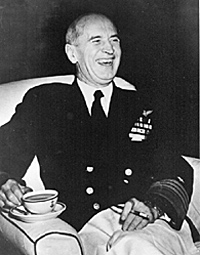 The US Navy Admiral Most Historians Love to Hate
The US Navy Admiral Most Historians Love to Hate
Photo courtesy of U. S. Naval Institute Photo Archives.
U-boats "could" have won the war for Germany. Dönitz wanted a fleet of 300 boats before going to war - he had 56. Too late Germany developed the Type XXI boat which, if deployed in relatively small numbers, could have swept the seas. Admiral King had done "the best he could with what he had." And won.
From The New York Times, Tuesday, August 7, 1945:
- "FIRST ATOMIC BOMB DROPPED ON JAPAN;
MISSILE IS EQUAL TO 20,000 TONS OF TNT;
TRUMAN WARNS FOE OF A 'RAIN OF RUIN'
I was 12 now, going on 13. The war had lasted half my life. In August, 1945 my Dad, my Mom, and me were at Lewey Lake, high in the Adirondacks crowding around the Boyer's car radio to get the news of the atomic bombs, and then Japan's Unconditional Surrender. Two waitresses from the hotel rowed a double-ended Adirondack skiff to the tiny island out on the quiet dark lake under the mountains that I know well, and rang a dinner bell. The sound carried well across the water.
The war was over
King did have some important blind spots. One of them, his single-minded faith in his intelligence staff in Washington, could have led to a major disaster at Midway Island. The tradition of naval command gave Admiral Nimitz full authority in the Pacific. He trusted LCDR Joe Rochefort and his codebreakers at Pearl Harbor, and they put him at the right place, Midway, at the right time, early June, 1942, two weeks sooner than Washington estimated. (Reference: Layton and Pineau).
Admiral King had another important blind spot, not about strategy or tactics. It was about research, development, and deployment; he didn't understand that the march of science and technology, greatly accelerated in wartime, could help him win the war. King seemed to put technical people and their gadgetry in the same forgotten mold as bean counters. The previous spring [1941] King, then Atlantic Fleet commander, had brushed aside the pioneering centimetric [radar] system installed on the USS SEMMES, declaring, 'We want something for this war, not the next one.'" (Buderi, pg. 143)
King didn't grasp that in addition to "doing the best you can with what you've got," you've got to "research, develop, and deploy, so you'll have what you're going to need."
Fleet Admiral Ernest J. King was a leader, a patriot, totally devoted to Allied defeat of the Axis powers, and the architect of victory in the Atlantic and Pacific. Thank you, Admiral King.
References:
Baer, George W., One Hundred Years of Seapower; The U.S. Navy, 1890-1990, Stanford University Press, Stanford, 1993
Blair, Clay, Hitler's U-boat War, The Hunters, 1939-1942, Random House, New York, 1996
Buderi, The Invention that Changed the World, Simon and Schuster, New York, 1996
Buell, Thomas B., Master of Sea Power, Little Brown and Company, Boston, 1980
Cagle, Malcom W., and Frank A. Manson, The Sea War in Korea, Naval Institute Press, Annapolis, Maryland, 1957.
Gannon, Michael, "The U-boat War," Discovery Channel program.
Layton, Edwin T., with Roger Pineau, And I was There- Pearl Harbor and Midway-Breaking the Secrets, William Morrow and Company, Inc., New York, 1995.
Morrison, Samuel Eliot, The Battle of the Atlantic, September 1939 to May, 1943 (Volume I of the History of United States Naval Operations in World War II), Copyright 1947, Little, Brown and Company, Boston, 1988
Padfield, Peter, War Beneath the Sea, Submarine Conflict During World War II John Wiley & Sons, Inc., New York, 1995
Appendix from Jim Pennington
AN EXAMPLE OF "RESEARCH, DEVELOP, DEPLOY SO YOU'LL HAVE WHAT YOU'RE GOING TO NEED" - THE MK. 32 ANTISUBMARINE TORPEDO
The Navy's Mk. 32 program started in 1942. It was the world's first active acoustic homing torpedo. Unlike the Mk. 24 "Cutie" (aka "Fido"), which homed on the noise of a ship's wake, the Mk. 32 didn't just listen, it pinged -- sent out sound waves -- looking for a target as it swam downward on a spiral search. It was an underwater guided missile.
If the Mk. 32 had been available in 1942 one or more might have found German submarines, swimming until the Mk 19 contact exploder detonated the 107 pounds of HBX explosive against the sub's hull -- a bad day for the gallant U-bootfahrer aboard.
Active acoustic homing technology finally "worked" about 25 years after the Mk. 32 program started, resulting in the Mk. 48 and other modern anti-submarine torpedoes.
Copyright Anthony James Pennington, 2001. All rights reserved.
Great stuff JIM – thanks. All Members and researchers are encouraged to do similar research and send it in.
Back to KTB # 164 Table of Contents
Back to KTB List of Issues
Back to MagWeb Master Magazine List
© Copyright 2002 by Harry Cooper, Sharkhunters International, Inc.
This article appears in MagWeb (Magazine Web) on the Internet World Wide Web. Other articles from military history and related magazines are available at http://www.magweb.com
Join Sharkhunters International, Inc.: PO Box 1539, Hernando, FL 34442, ph: 352-637-2917, fax: 352-637-6289, www.sharkhunters.com
